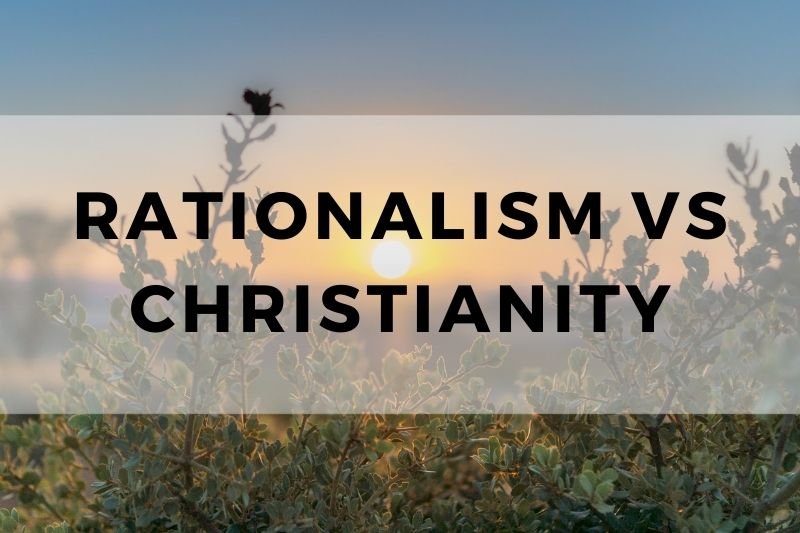
Rationalism and Christianity are two distinct worldviews that shape how we understand reality. Rationalism relies on reason as the primary source of knowledge, while Christianity emphasizes faith in divine revelation. This contrast has sparked centuries of debate.
While rationalists argue for knowledge based on logic and evidence, Christians often look to scripture and tradition for truth. The conflict between these perspectives touches on key aspects of life, including knowledge, morality, and the existence of God. Understanding this divide is essential to grasp the deeper philosophical and theological debates that continue to influence modern thought.
Introducing Rationalism
Rationalism is the belief that reason is the primary source of knowledge. It argues that truth can be discovered through logical thinking and intellectual processes. Rationalists trust the power of the human mind to understand the world. They reject reliance on sensory experience or divine revelation. Key figures in rationalism include René Descartes and Baruch Spinoza. They believed that through reason, we can arrive at universal truths. Rationalism has influenced many fields, from science to ethics, by emphasizing logic over belief. This philosophy contrasts sharply with views that prioritize faith or divine knowledge.
Understanding Christian Philosophy
Christian philosophy is rooted in the belief in God and the teachings of Jesus Christ. It emphasizes faith in divine revelation through scripture and tradition. Christians believe that truth is ultimately found in God’s word, as revealed in the Bible. This worldview holds that faith and reason can work together, but faith is considered the starting point for understanding. Christian philosophy also stresses the importance of love, compassion, and morality. Key figures like Augustine and Aquinas contributed to shaping Christian thought, integrating philosophy with theology. Christian philosophy provides a framework for understanding life, morality, and the nature of existence.
Rationalism Vs Christianity: The Conflict
#1. Source of Knowledge
Rationalism views reason as the primary source of knowledge. It relies on logic and intellect to discover truths. Christianity, on the other hand, believes that divine revelation is the ultimate source of knowledge. The Bible and religious tradition guide Christian understanding. For rationalists, knowledge comes through human reasoning; for Christians, it’s rooted in faith and scripture. This difference in how knowledge is acquired forms the foundation of the conflict between these two philosophies.
#2. Role of Faith vs. Reason
In rationalism, reason holds the highest authority. Faith is seen as unreliable and secondary. Christianity places faith above reason. Christians believe that faith in God is essential for understanding truth. Reason is important, but it is faith that provides the foundation for belief. This conflict arises because rationalists trust human intellect, while Christians trust divine wisdom revealed through faith.
#3. Understanding of the Universe
Rationalists believe the universe can be understood through scientific observation and reason. They see the laws of nature as something that can be discovered through logic and empirical evidence. Christians view the universe as created by God, with a divine purpose. For them, the universe is a reflection of God’s plan. The rationalist view is based on observable facts, while the Christian view is based on faith in divine creation and purpose.
#4. Existence of God
For rationalists, the existence of God is a question to be explored through reason and evidence. Some rationalists may reject God’s existence due to the lack of empirical proof. Christians, however, believe in God’s existence as a matter of faith. Their belief is not based on physical evidence, but on spiritual conviction and biblical teachings. The rationalist stance requires proof, while Christianity holds that God’s existence is a matter of belief.
#5. Morality and Ethics
Rationalism argues that morality can be understood through reason. Ethical principles are based on logic, human nature, and social agreements. Christians believe that morality is defined by God’s will, as revealed through scripture. For them, ethical behavior is about following divine commandments. The conflict lies in the foundation of morality: for rationalists, it is grounded in human reasoning; for Christians, it is based on divine authority.
#6. Miracles and Supernatural Events
Rationalists often reject the idea of miracles, viewing them as unexplainable events that defy natural laws. They argue that such occurrences lack empirical evidence and cannot be verified through reason. Christianity, however, embraces the concept of miracles. Christians believe that miracles are acts of divine intervention, demonstrating God’s power and presence in the world. For Christians, the supernatural is real, while rationalists see it as either myth or misinterpretation.
#7. The Problem of Evil
Rationalists approach the problem of evil by questioning the existence of an all-powerful and benevolent God. They see the presence of suffering and evil as evidence against the traditional Christian view of God. Christianity, in contrast, explains evil as a result of human free will and the fall of man. Christians believe that suffering is part of God’s greater plan, and that faith offers a path to redemption. Rationalists see the problem as a logical challenge to religious beliefs, while Christians view it as a spiritual test.
#8. Nature of Truth
For rationalists, truth is objective, discoverable through reason and evidence. They believe that logical consistency and empirical data define what is true. Christianity, however, holds that truth is revealed through God and scripture. Christians view spiritual truths as absolute, while rationalists see truth as something that can be tested and proven. The difference lies in whether truth is discovered through human reason or revealed by divine authority.
#9. Human Nature and Purpose
Rationalism believes that human nature can be understood through science and reason. Humans are seen as rational beings capable of determining their purpose through logic. Christianity teaches that human nature is fallen and in need of redemption. Christians believe that human purpose is to serve and worship God. Rationalists argue that humans create their own meaning, while Christians believe their purpose is given by God.
#10. Afterlife and Eternity
Rationalists often reject the concept of an afterlife due to the lack of empirical evidence. They view death as the end of existence, with no continuation beyond the physical world. Christianity, in contrast, believes in eternal life. Christians hold that after death, individuals are judged and either rewarded with eternal life in Heaven or punished in Hell. This belief in an afterlife is central to Christian philosophy and offers hope beyond earthly life. Rationalists see no proof for life after death, while Christians view it as a foundational truth.
Rationalism Vs Christianity: Common Ground
#1. Belief in the Power of Reason
Both rationalism and Christianity acknowledge the importance of reason. Rationalists emphasize it as the primary tool for understanding the world. Christians, too, value reason but see it as a tool that must work alongside faith. In both philosophies, reason is important in making decisions, solving problems, and understanding reality. However, the role and authority of reason differ between the two.
#2. Commitment to Ethical Living
Both rationalism and Christianity stress the importance of ethical living. Rationalists argue that ethics can be derived through reason, focusing on human welfare and social harmony. Christians believe that ethical living is guided by God’s commandments and the teachings of Jesus. Despite different foundations, both systems agree that moral behavior is essential for a just society.
#3. Importance of Human Dignity
Rationalism and Christianity both uphold human dignity. Rationalists believe in the inherent worth of individuals due to their capacity for reason and morality. Christians view human dignity as a gift from God, created in His image. In both worldviews, human beings are seen as worthy of respect and care, though for different reasons.
#4. Emphasis on Free Will
Rationalism and Christianity both support the concept of free will. Rationalists argue that humans are free to choose based on reason and personal choice. Christianity, however, teaches that free will is given by God, allowing individuals to choose between good and evil. In both systems, free will is vital in shaping human decisions and moral responsibility.
#5. Recognition of Human Struggles
Both rationalism and Christianity acknowledge human struggles. Rationalists believe that humans face challenges due to the complexities of life and the limitations of reason. Christians recognize that human struggles are part of the human condition, often linked to sin and spiritual growth. In both philosophies, facing and overcoming struggles is seen as a part of the human experience.
#6. Focus on the Search for Truth
Both rationalism and Christianity emphasize the pursuit of truth. Rationalists believe that truth can be discovered through reason, evidence, and intellectual inquiry. Christians also value truth but believe it is ultimately revealed through God’s word and divine revelation. Despite different methods, both systems recognize the importance of seeking truth, whether through human intellect or faith.
#7. Desire for Social Progress
Rationalism and Christianity both aim for social progress, though they approach it differently. Rationalists seek progress through reason, science, and the betterment of society using logical solutions. Christianity promotes social progress through love, charity, and the teachings of Jesus. Both perspectives desire a world that improves for future generations, but their methods and motivations differ.
#8. Influence on Western Thought
Rationalism and Christianity have both significantly shaped Western thought. Rationalism laid the foundation for modern science and philosophy, influencing areas like logic and epistemology. Christianity, through centuries of theological and philosophical discourse, has influenced ethics, law, and political systems. Together, these worldviews have formed much of the intellectual and cultural landscape of the Western world.
#9. Value of Intellectual Exploration
Both rationalism and Christianity value intellectual exploration, but with different aims. Rationalists believe that knowledge is acquired through logical reasoning and empirical evidence. They encourage the exploration of ideas based on reason alone. Christianity encourages intellectual exploration within the context of faith, with a focus on understanding God’s creation and His will. While their methods differ, both philosophies value the search for knowledge.
#10. Role of Personal Responsibility
Rationalism and Christianity both stress the importance of personal responsibility. Rationalists believe that individuals are responsible for making decisions based on reason and ethical principles. Christians also emphasize personal responsibility, but in the context of fulfilling God’s commandments and living according to His will. In both views, personal responsibility is essential for moral conduct and societal harmony.
Closing Thoughts
Rationalism and Christianity represent two distinct approaches to understanding the world. While they differ greatly in their methods and foundational beliefs, both emphasize the importance of reason, ethics, and personal responsibility. Rationalism seeks truth through logic and evidence, while Christianity finds truth in divine revelation and faith.
Despite these differences, both worldviews have profoundly shaped Western thought and continue to influence how we approach issues like morality, the nature of the universe, and human purpose. Understanding the philosophical divide between rationalism and Christianity provides valuable insight into the ongoing dialogue between reason and faith.
